
Politics of Bangladesh takes place in a framework of a parliamentary representative democratic republic, whereby the Prime Minister of Bangladesh is the head of government, and of a multi-party system. Executive power is exercised by the government. Legislative power is vested in both the government and parliament. The Constitution of Bangladesh was written in 1972 and has undergone sixteen amendments. The Economist Intelligence Unit has rated Bangladesh as "hybrid regime" in 2016.
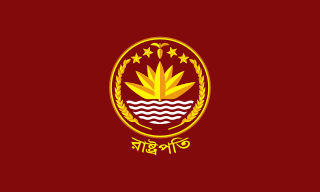
The President of Bangladesh is the Head of State of Bangladesh.

The Jatiya Sangsad, often referred to simply as the Sangsad or JS and also known as the House of the Nation, is the supreme legislative body of Bangladesh. The current parliament of Bangladesh contains 350 seats, including 50 seats reserved for women, which are apportioned on elected party position in the parliament. Elected occupants are called members of parliament or MP. The 11th National Parliamentary Election was held on 30 December 2018. Elections are held every five years unless the parliament is dissolved before that time.

Hussain Muhammad Ershad is a former Bangladeshi Army Chief and politician who served as the President of Bangladesh from 1983 to 1990, a time many consider to have been a military dictatorship.
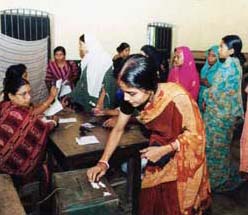
Elections in Bangladesh gives information on election and election results in Bangladesh.

The Jatiya Party is a conservative political party in Bangladesh. The current chairman of the party is Hussain Mohammad Ershad. On January 3, 2019, the party announced its decision to join the Awami League-led Grand Alliance after having been in opposition for the previous parliamentary term. However, the party backtracked the next day and announced that it intended to remain part of the opposition. Currently, it holds Rangpur out of Bangladesh's 12 city corporations.

The Fifth National Parliamentary Elections 1991 were held in Bangladesh on 27 February 1991. The result was a victory for the Bangladesh Nationalist Party, which won 140 of the 300 seats. Voter turnout was 55.4%. As a result, BNP leader Khaleda Zia was sworn in as Prime Minister on 20 March.
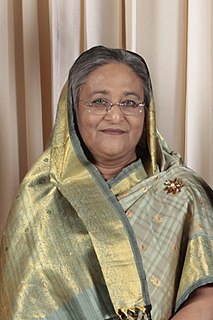
The Seventh National Parliamentary Elections 1996 were held in Bangladesh on 12 June 1996. The result was a victory for the Bangladesh Awami League, which won 146 of the 300 seats, beginning Sheikh Hasina's first-term as Prime Minister. Voter turnout was 75.6%, the highest to date. This election was the second to be held in 1996, following controversial elections held in February a few months earlier.
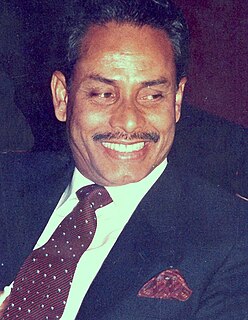
General elections were held in Bangladesh on 7 May 1986. A total of 1,527 candidates contested the election. The result was a victory for the Jatiya Party, which won 153 of the 300 seats. Voter turnout was 61.1%. Bangladesh Nationalist Party, the winner of the previous elections, boycotted the election.

General elections were held in Bangladesh on 3 March 1988. They were boycotted by several major parties, including the Bangladesh Awami League, the Bangladesh Nationalist Party, the Communist Party of Bangladesh, Jamaat-e-Islami Bangladesh, the Bangladesh Krishak Sramik Awami League, the National Awami Party (Muzaffar) and the Workers Party of Bangladesh. The result was a victory for the Jatiya Party, which won 251 of the 300 seats. Voter turnout was 52.5%.
The Sixth National Parliamentary Elections 1996 was held in Bangladesh on 15 February 1996. They were boycotted by most opposition parties, and saw voter turnout drop to just 21%. The result was a victory for the Bangladesh Nationalist Party (BNP), which won 300 of the 300 elected seats. This administration was short lived however, only lasting 12 days before the installation of caretaker government and fresh elections held in June.
The history of Bangladesh after independence begins in 1971 with the independence of Bangladesh from Pakistan.
The 1982 Bangladeshi military coup d'état deposed the civilian government headed by the president of Bangladesh Abdus Sattar and brought to power the Chief of Army Staff of the Bangladesh Army Lt. Gen. Hussain Muhammad Ershad. After serving initially as the Chief Martial Law Administrator, Ershad assumed the post of president in 1983 and ruled until 1990.

Presidential elections were held in Bangladesh on 15 October 1986. The result was a victory for incumbent Hussain Muhammad Ershad, who had assumed the office in 1983 following a military coup. Ershad reportedly won 84.1% of the vote with a voter turnout of 54.9%. However the elections were controversial as they were boycotted by all major opposition candidates and there were reports of irregularities.
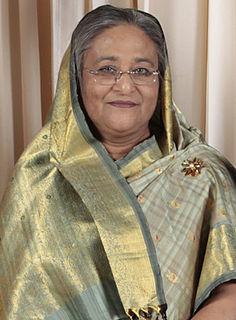
General elections were held in Bangladesh on 5 January 2014, in accordance with the constitutional requirement that the election must take place within the 90-day period before the expiration of the term of the Jatiya Sangshad on 24 January 2014. The elections were controversial, with almost all major opposition parties boycotting and 153 of the total 300 seats being uncontested. Around 21 people were killed on election day.
The 1990 mass uprising was a democratic movement that took place on 4 December and led to the fall of General Hussain Muhammad Ershad in Bangladesh. The uprising was the result of a series of popular protests that started from 10 October 1990 to topple General Ershad who came to power in 1982 by imposing martial law and replaced a democratically elected President through a bloodless coup.
Since the independence of Bangladesh, the presidential election process has been changed several times due to both the Presidential and Parliamentary arrangements. According to the Second Schedule to the Constitution of 1972, the president of the parliament used to be elected by a secret vote. Later, according to the fourth amendment to the constitution, the provision of the direct election system of presidential election was introduced. But soon after 12th Amendment to the Constitution, the provision of presidential elections through an indirect election was introduced after the parliamentary system was installed. At present, President is elected by an indirect election by the members of parliament as per Article 48 of the Constitution.

The 1980s was a decade of the Gregorian calendar that began on January 1, 1980, and ended on December 31, 1989. For Bangladesh this decade was characterized by economic hardship, natural disasters and military dictatorship. Hussain Muhammad Ershad ruled Bangladesh almost throughout the decade. Infrastructure development was slow but there was notable progress in local government administration, population control and NGO led microfinance activities which boosted the rural economy. The urge of freedom of speech and return to democracy influenced the cultural activities in the decade.

The 1990s was a decade of the Gregorian calendar that began on January 1, 1990, and ended on December 31, 1999. For Bangladesh this decade was characterized by transition to democracy, rapid urbanisation and globalization and struggle for free and fair elections. The newly earned democracy influenced the cultural activities in the decade.
The National Unity Process is a political initiative in Bangladesh launched by Dr. Kamal Hossain, a long-standing proponent of a period of national unity government for political reform in the country. The initiative has received support from major opposition parties. The aim of the initiative has been to pressure the Awami League government of Prime Minister Sheikh Hasina to hold a free and fair election in December 2018 with the participation of all major political parties. The previous general election in Bangladesh, held in 2014, was boycotted by major opposition parties and was not deemed credible by the United States, the United Kingdom, the European Union and the United Nations.





















